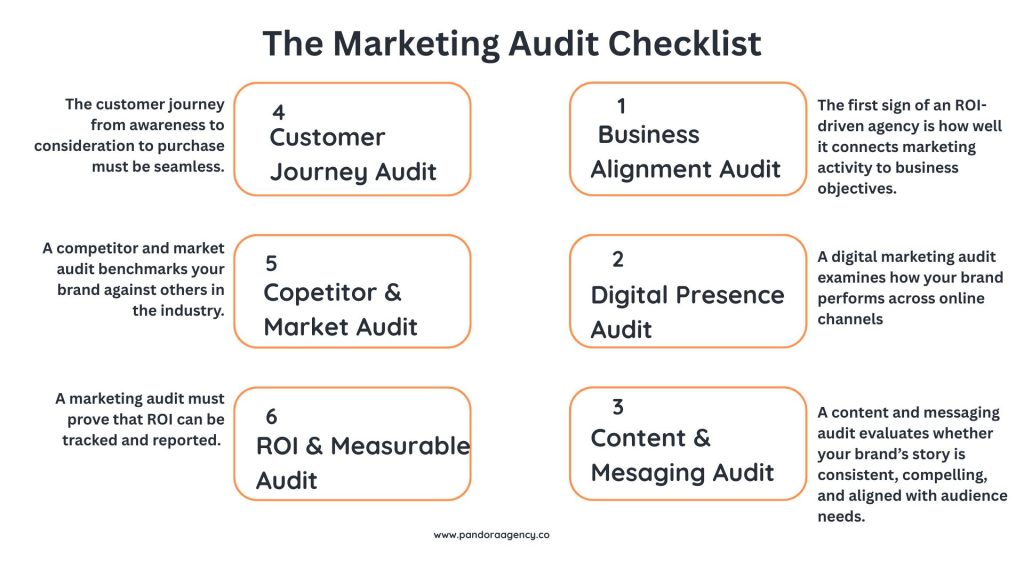For every Chief Marketing Officer, hiring a new agency feels like a leap of faith. The decks are polished, the pitches are persuasive, and the promises of growth sound irresistible. But behind the slides and creative samples, there’s always one critical question: can this agency actually deliver measurable results?
Too often, the answer is no. Many organizations discover months into a contract that campaigns look good on the surface but fail to move the revenue needle. By then, budgets are drained, timelines are wasted, and trust has evaporated. This is the risk of committing to an agency without first demanding proof.
That’s where a marketing audit comes in. A proper audit gives CMOs the clarity they need before signing a deal. It exposes weaknesses, highlights opportunities, and reveals whether an agency’s approach is aligned with real business goals. More than a checklist, it’s a filter that separates agencies that talk about ROI from those that actually deliver it.
In this article, we’ll explore why audits matter and break down a marketing audit checklist every CMO should look forward to.
What Is a Marketing Audit?
A marketing audit is a structured assessment of a company’s marketing efforts, designed to uncover what’s working, what’s underperforming, and what opportunities are being overlooked. Unlike the glossy reports agencies often present during pitches, a true audit digs deeper. It’s diagnostic, and the goal is to gain clarity.
At its simplest, a marketing audit assesses whether your marketing activities are aligned with your business objectives. Are your campaigns actually driving sales? Are you reaching the right audience with the right message? Are you investing resources into channels that generate measurable returns? A proper audit answers these questions with evidence, not assumptions.
In today’s digital-first world, this process often extends into a digital marketing audit. Here, the evaluation encompasses the entire online footprint, including website performance, SEO health, paid advertising, social media activity, content marketing strategy, analytics setup, and conversion pathways. It’s about understanding how each digital touchpoint contributes to customer acquisition and long-term growth.
Why a Marketing Audit Matters Before Choosing an Agency
Choosing the wrong agency can be an expensive mistake. On the surface, most agencies look the same, with impressive presentations, polished case studies, and bold claims of growth.
But beneath the packaging, their ability to deliver measurable results often varies widely. This is why a marketing audit is so important before committing. It’s not just an exercise; it’s a safeguard. Here are two outstanding impacts of a good marketing audit:
- A proper audit allows CMOs to cut through the noise and see whether an agency can back up its promises with evidence.
- It highlights gaps in current marketing activities, exposes inefficiencies that waste budget, and ensures every recommended strategy ties back to business goals.
In a landscape where marketing spend is under increasing scrutiny, this level of accountability is non-negotiable.
For CMOs, getting an audit before signing with an agency is the difference between buying promises and investing in proof. It ensures you’re not swayed by creativity alone but by a partner’s ability to connect ideas to ROI. In other words, the audit is your insurance policy against wasted spending and unmet expectations.
The Marketing Audit Checklist: What CMOs Should Look For

A marketing audit isn’t a box-ticking exercise. It’s a deep evaluation that reveals whether your marketing is built to generate measurable ROI or if it’s just running on assumptions. For CMOs, demanding a structured audit before signing with an agency provides transparency and sets the foundation for accountability. Here’s what your checklist should cover.
1. Business Alignment Audit
The first sign of an ROI-driven agency is how well it connects marketing activity to business objectives. This part of the audit should reveal whether campaigns are tied directly to revenue, lead generation, customer retention, or market expansion. If an agency can’t demonstrate this alignment, you risk paying for creativity that looks good but fails to contribute to growth. A strong audit will translate your business goals into marketing KPIs and show exactly how each tactic supports the bigger picture.
2. Digital Presence Audit
A digital marketing audit is essential in today’s landscape. It examines how your brand performs across online channels, including SEO health, paid advertising efficiency, website usability, and analytics setup. For CMOs, this means knowing whether your website is converting visitors, if ad spend is being wasted, and whether tracking tools are accurately capturing data. Without this clarity, decisions are made in the dark, and ROI becomes impossible to measure.
3. Content & Messaging Audit
Content is often where brands either resonate with their audience or fall flat. A content and messaging audit evaluates whether your brand’s story is consistent, compelling, and aligned with audience needs. Are your blogs, social posts, and campaigns addressing real pain points? Do they reflect your positioning in the market? A credible audit will flag gaps, highlight strengths, and suggest adjustments to improve engagement and trust.
4. Customer Journey Audit
Marketing doesn’t end when someone clicks on an ad or fills out a form. The customer journey from awareness to consideration to purchase must be seamless. A journey audit identifies leaks in your funnel: Are leads being nurtured properly? Is there friction in the conversion process? Are sales teams equipped with the right marketing support? Without this perspective, campaigns may generate leads but fail to convert them into revenue.
5. Competitor & Market Audit
No marketing strategy exists in isolation. A competitor and market audit benchmarks your brand against others in the industry. It reveals where competitors are winning, whether through search visibility, stronger positioning, or better customer experiences, and identifies gaps you can exploit. For CMOs, this insight is invaluable for ensuring your agency isn’t just following trends but helping you outpace rivals.
6. ROI & Measurement Audit
Finally, and most importantly, a marketing audit must prove that ROI can be tracked and reported. This means having attribution models in place, a clear process for calculating ROI, and tools like dashboards or marketing ROI calculators to make performance transparent. If an agency hesitates here, it’s a red flag. ROI should never be vague; it should be visible, measurable, and central to every campaign.
A strong marketing audit will touch each of these areas, giving CMOs confidence that an agency isn’t selling empty promises but building strategies tied to performance. Anything less leaves your brand exposed to wasted spend and underwhelming results.
Related: Why Most Agencies Fail to Deliver Marketing ROI
Red Flags to Watch Out for in an Audit
Not every audit is created equal. Some agencies present what looks like a thorough evaluation, but in reality, it’s little more than a sales pitch. For CMOs, being able to spot these red flags early prevents wasted time and misplaced trust.
A. Surface-level audit
The first warning sign is the surface-level audit. These are the reports filled with keywords, traffic snapshots, or social media charts, but no deeper analysis of how those metrics tie back to revenue. They may highlight activity, but they don’t tell you if the activity is profitable. An audit that doesn’t connect marketing outputs to business outcomes is little more than a glossy brochure.
B. Lack of transparency
Another red flag is a lack of transparency. If an agency can’t explain the data sources they’re using, how they attribute results, or what benchmarks they’re comparing against, that’s a sign of trouble. A reliable audit is clear, verifiable, and replicable. Anything vague should raise concern.
Beware also of audits that feel more like a sales pitch than a diagnosis. If every recommendation conveniently points toward one pre-packaged solution or a quick fix, the audit isn’t about understanding your business, it’s about closing a deal. Real audits present options, outline risks, and prioritize long-term ROI, not quick wins.
C. Avoids the topic of ROI
Finally, an audit that avoids the topic of ROI altogether is the clearest red flag of all. If an agency cannot show you how they’ll track and calculate Marketing ROI, they are not prepared to be held accountable.
An authentic audit is objective, data-driven, and brutally honest. Anything less should be a dealbreaker for any CMO serious about performance.
Key Takeaway
For CMOs, the decision to hire a marketing agency is too important to be left to glossy presentations or persuasive pitches. A marketing audit is the safeguard that reveals whether an agency is equipped to deliver measurable ROI or if they’re simply selling creativity without accountability.
The strongest audits go beyond surface metrics. They align campaigns with business goals, analyze the full digital footprint, evaluate customer journeys, and benchmark against competitors, all while making ROI visible and measurable. The weakest audits do the opposite: they focus on vanity metrics, hide data, and avoid the tough questions about accountability.
Before signing with any agency, demand a thorough audit. Use it as your filter to separate talk from proof and ensure your marketing investments are tied directly to business growth.
Ready to see how your current marketing measures up? Book a Free Audit.






Leave a Reply